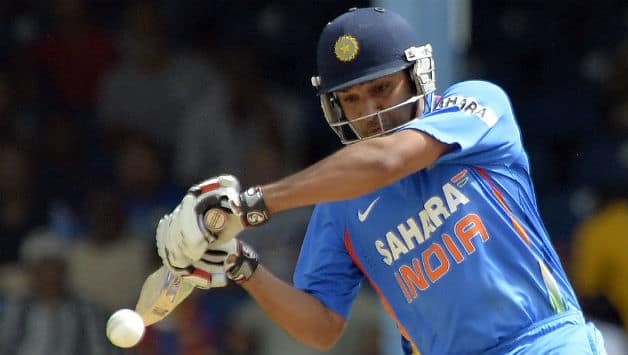
Cricket Country Staff
Editorial team of CricketCountry.
Written by Cricket Country Staff
Published: Jul 16, 2013, 02:11 PM (IST)
Edited: Jul 16, 2013, 02:11 PM (IST)


Rohit Sharma sacrificed his natural game in West Indies and scored runs at a strike rate of 61.64 © AFP
Mumbai: Jul 16, 2013
Indian cricketer Rohit Sharma, who was handed the role of opening in the ICC Champions Trophy 2013 and during the tour of West Indies, scored 177 runs from five matches in England and 217 runs at an average of 54.25 in West Indies. After scoring 83 against England in 2013, Rohit was handed the job opening the innings for India with Shikhar Dhawan during the Champions Trophy. He said the offer came as a surprise to him but he had ‘self-belief’.
“The offer to open the innings was thrown to me during the home ODI series against England. It came as a surprise but I had self-belief. I stroked 83 at Mohali and there has been no looking back. Somewhere, I knew that in the longer run, I may have to open for India and I was well-prepared. It’s obviously different than batting in the middle overs. I have to ensure a good start. Batting against the new ball is a different ball-game. There is lateral movement and I have to ensure we keep wickets intact. On both the tours, we didn’t mind being 20 for no loss in 10 overs, because we knew could cover up the run rate in a couple of overs. The idea was to see off the new ball,” Rohit was quoted as saying by Times of India.
Rohit said that he aimed at playing straight in England and settling down.
“I was leaving the ball much more, playing straighter. I had to avoid driving the ball too. Though having the cut and the pull in my armoury has helped me immensely because in England, all the fast bowlers were bowling a shorter length as the wickets had something for them. I was looking to stay on the wicket longer because it is said that England is the best place in the world to bat once you are ‘set’ in the middle. I knew I could play my big shots then.”
He further added, “It’s a relatively new role for me, and I’m learning every day. I watched a lot of videos of some of the greatest openers, with our analyst Dhananjay. Watching their approach against the new ball really helped.”
Rohit felt coach Duncan Fletcher has played a vital role in training the cricketers at England, with vast amount of experience of coaching in England.
“He should get as much credit as the players. He has played a major role. He has the experience of coaching in England, so he knew the secret of success in those conditions. He didn’t look to alter our technique, because he realises that would be only confuse us. He looked to work on our attitude, our approach.”
Speaking on the spot-fixing controversy that sparked off just before team India left for Champions Trophy, he said, “The controversy was completely off our mind when we left India. We just wanted to do well. We had a new, huge challenge in front of us. We had a bunch of young players, and most of them hadn’t even played in England. It wasn’t easy. We decided to work hard, and not bother about winning or losing. That was our mindset. It paid off and we didn’t lose a single game, not even in the warm-ups. Even at practice, we were giving 100 per cent.”
Rohit felt that the experience of leading Mumbai Indians helped him become more responsible ahead of the Champions Trophy.
“It has improved what I would call our ‘situation awareness.’ In the IPL, you are often single-handedly responsible for the fortunes of your team. It makes you more responsible as a player. In my case, the experience of having captained the Mumbai Indians helped me become even more responsible. That reflected in my game. My strike rate in the Windies was 61.64, which shows that I sacrificed my natural game,” he concluded.
This website uses cookies so that we can provide you with the best user experience possible. Cookie information is stored in your browser and performs functions such as recognising you when you return to our website and helping our team to understand which sections of the website you find most interesting and useful.
Strictly Necessary Cookie should be enabled at all times so that we can save your preferences for cookie settings.
If you disable this cookie, we will not be able to save your preferences. This means that every time you visit this website you will need to enable or disable cookies again.
